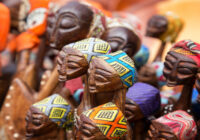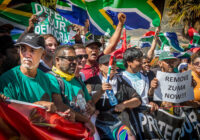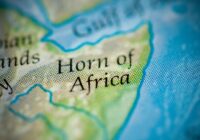The most recent Ebola outbreak is only the tip of the iceberg of problems faced by the Democratic Republic of Congo.
Just when it seemed things couldn’t get any worse in the Democratic Republic of Congo, the conflict-ridden nation has been hit by an outbreak of Ebola. As it is not the first time the DRC has had to deal with the disease, the country is experienced and well equipped to do so. However, the proximity of the reported cases of the virus to the Congo River makes this outbreak a seriously challenging one.
Those challenges are compounded by the ongoing political predicament that is threatening to tear the country apart. With incumbent President Joseph Kabila having reached the end of his legitimate tenure in 2016, the DRC has been ravaged by armed skirmishes, humanitarian crises and internal displacement on a truly massive scale. As such, the Ebola outbreak couldn’t have come at a worse time.
The DRC is no stranger to the Ebola virus, being the place where it was first discovered in 1976. Since then, the country has suffered nine different outbreaks (five in the last 10 years alone), and has developed robust diagnostic laboratories to identify the disease and garnered experience in limiting its spread. With much of the country isolated due to poor road infrastructure, controlling Ebola has often been a straightforward process. The last outbreak, for example, occurred in 2017 and claimed the lives of four people — a relatively microscopic figure compared to the 11,325 deaths precipitated by the 2014-16 outbreak in West Africa.
But this most recent spate of Ebola infections is more concerning. Already, there have been 42 reported cases, of which 23 have been deadly. What’s more, the disease is thought to have reached the city of Mbandaka, on the banks of the Congo River. Not only is limiting the spread of the disease far more difficult in an urban environment, but the Congo River’s status as the region’s major transportation and commerce hub means that there is now an elevated chance of Ebola spreading downstream to the capital Kinshasa and further afield to neighboring countries.
The World Health Organization (WHO) came under significant criticism over its handling of the West Africa Ebola outbreak. On that occasion, it took the WHO six months to declare an international emergency and call for help, resulting in the monumentally high death toll. This time around, it has been keen to learn from those mistakes; medical teams were on the ground within two days of the first reported case and the body has already made $2.6 million available from its Contingency Fund for Emergencies for tackling the issue. The UK government and the Wellcome Trust have together pledged just over $4 million toward the cause, though the WHO estimates a total of $18 million will be needed for a comprehensive three-month operation.
WHO and partners are working to ring vaccinate high-risk populations in #Ebola-affected areas in #DRC. Ring vaccination is very different from regular mass immunization campaigns and much more targeted. @PeteSalama explains https://t.co/b4dmuaTWHv pic.twitter.com/dqmWCisSsL
— World Health Organization (WHO) (@WHO) May 20, 2018
However, in its scramble to protect itself from further criticism, the WHO appears to have missed a trick with regards to the current government of the DRC. In what looks like a bid to politicize the nascent crisis for his own interests, WHO chief Tedros Adhanom Ghebreyesus lauded the leadership of Joseph Kabila and thanked him for his cooperation with international partners such as UNICEF and Doctors Without Borders.
Such a statement has raised eyebrows for its willingness to overlook Kabila’s appalling track record of safeguarding the lives, let alone the general health, of his populace. Since the beginning of 2015, more than 300 people have been killed in political protests against Kabila’s rule, with millions more internally displaced as a result of increasing militia activity.
The DRC was supposed to hold elections for Kabila’s successor in November 2016, but these have been repeatedly postponed, citing bad infrastructure and budgetary constraints. Kabila has also moved to marginalize his opponents, with leading candidate Moïse Katumbi a prime example of the underhand means employed by the incumbent president. Katumbi has been in self-imposed exile since 2016, after Kabila filed charges of real estate fraud against him. He was later sentenced to 36 months in prison in absentia and has been rallying his political campaign from overseas ever since.
Earlier this year, Katumbi launched his presidential bid from South Africa with the Together for Change party, promising to return to the DRC by June regardless of the accusations against him. He has since mitigated that pledge by stating he will only return when convinced the elections are to take place, and has called on help from the surrounding countries to coerce Kabila into honoring his electoral obligations. In the meantime, the people of the DRC continue to suffer. According to UNICEF, ongoing conflict in the Kasai region of the country has led to the internal displacement of 1.3 million people, with 770,000 children suffering from acute malnutrition and 400,000 of those on the verge of death.
One Ebola expert has commented that he believes the current outcrop of reported cases may only be “the tip of the iceberg” with regard to the disease’s extent. It is also clear that Ebola itself is only the tip of the iceberg of problems faced by the DRC. If the country does manage to overcome this latest epidemic — and, as things currently stand, that’s a big if — an even greater threat is lurking inside its presidential office.
Of course, there’s no doubt that swift action and full cooperation between the WHO and the Kabila administration are needed to control the Ebola outbreak. But that’s no reason for the former to lend credibility to the latter’s increasingly inhumane regime. For a country that has never experienced a peaceful handover of power since its liberation in 1960, democratic reforms and free, fair elections are the only antidote capable of giving the DRC a long-term clean bill of health.
The views expressed in this article are the author’s own and do not necessarily reflect Fair Observer’s editorial policy.
Photo Credit: Sergey Uryadnikov / Shutterstock.com
Support Fair Observer
We rely on your support for our independence, diversity and quality.
For more than 10 years, Fair Observer has been free, fair and independent. No billionaire owns us, no advertisers control us. We are a reader-supported nonprofit. Unlike many other publications, we keep our content free for readers regardless of where they live or whether they can afford to pay. We have no paywalls and no ads.
In the post-truth era of fake news, echo chambers and filter bubbles, we publish a plurality of perspectives from around the world. Anyone can publish with us, but everyone goes through a rigorous editorial process. So, you get fact-checked, well-reasoned content instead of noise.
We publish 2,500+ voices from 90+ countries. We also conduct education and training programs
on subjects ranging from digital media and journalism to writing and critical thinking. This
doesn’t come cheap. Servers, editors, trainers and web developers cost
money.
Please consider supporting us on a regular basis as a recurring donor or a
sustaining member.
Will you support FO’s journalism?
We rely on your support for our independence, diversity and quality.






